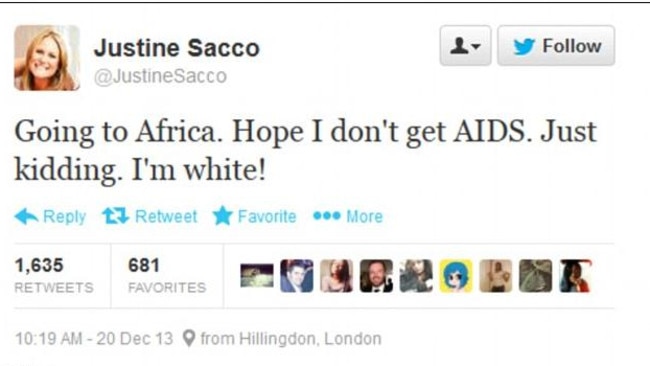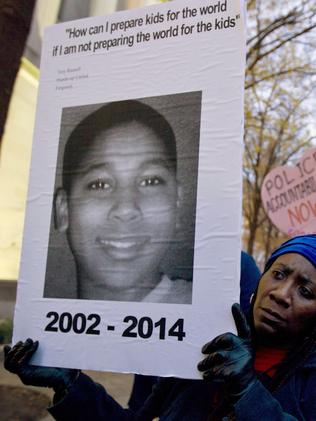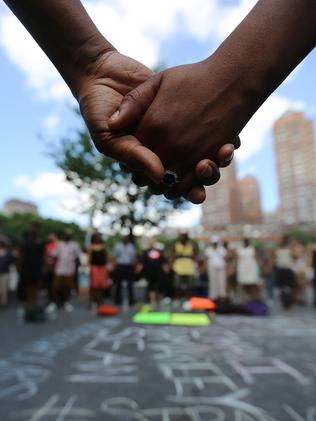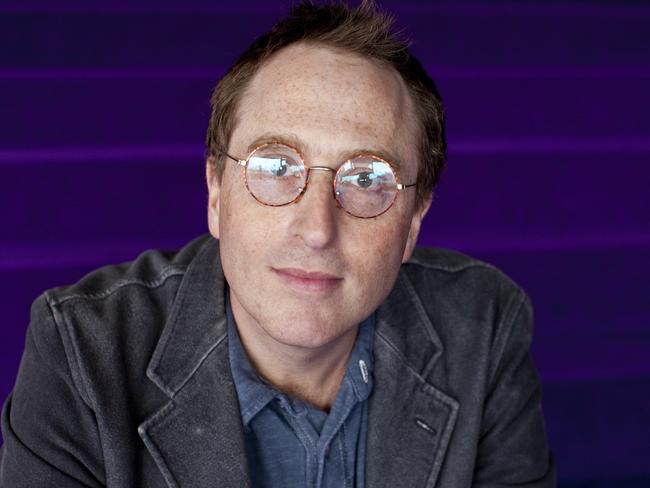Justine Sacco speaks about her experience one year after the tweet that ruined her life
TWELVE words. That’s all it took to ruin Justine Sacco’s life. She lost her job, had trouble dating and copped death threats.
“GOING to Africa. Hope I don’t get AIDS. Just kidding. I’m white!”
It was the tweet that would define her and undo her.
In 2013, Justine Sacco’s world unravelled in 64 characters.
Now, more than a year later, the former PR consultant is back in the spotlight to reveal just how devastating a public shaming on Twitter can be.
Sacco had tweeted before boarding an international flight, unaware of the firestorm she would confront when she turned on her phone at the other end.
She deleted her tweet but it was too late. She would later lose her job, receive death threats and lock herself away from the public’s scorn.
If ever there was a cautionary tale about social media, surely it is this one.

#HASJUSTINELANDEDYET
Sacco, a PR consultant, boarded her plane for an 11-hour flight from London to Cape Town in December 2013. Initially, her tweet went unnoticed by her 170 followers until a writer named Sam Biddle spotted it and retweeted it to his 15,000 followers.
Unbeknown to Sacco, as she dozed over France and the eastern coast of Africa, her Twitter feed exploded.
“How did @JustineSacco get a PR job?!” one user exclaimed.
“In light of @JustineSacco disgusting racist tweet, I’m donating to @care today” another wrote. She was labelled a racist by tens of thousands of people she’d never met. Those same people would make it their mission to see her fired before she landed.
The hashtag #HasJustineLandedYet began trending.
“All I want for Christmas is to see @JustineSacco’s face when her plane lands and she checks her inbox/voicemail” one user wrote.
Another tweeted: “Oh man, @JustineSacco is going to have the most painful phone-turning-on moment ever when her plane lands” and another wrote “We are about to watch this @JustineSacco b**ch get fired. In REAL time. Before she even KNOWS she’s getting fired.”
It was fast becoming a PR nightmare not only for Sacco but for her employer IAC, the corporate owner of The Daily Beast, OKCupid and Vimeo. IAC put out the following statement almost immediately: “This is an outrageous, offensive comment. Employee in question currently unreachable on an into flight”.


One user even volunteered to meet Sacco at the airport when her plane landed so he could take her picture and those tens of thousands following her downfall could witness her reaction for themselves.
She apologised publicly and flew home before her holiday was over because, in part, a number of hotel staff threatened to strike if she stayed with them.
‘I CRIED OUT MY BODY WEIGHT IN THE FIRST 24 HOURS’
A year after her ordeal, Sacco has reappeared in print, trying to explain how one bad joke became a real-life horror story.
“Only an insane person would think that white people don’t get AIDS,” Sacco told author Jon Ronson for his new bookSo You’ve Been Publicly Shamed.
“To me it was so insane of a comment for anyone to make.
“I thought there was no way that anyone could possibly think it was literal. Unfortunately, I am not a character on South Park or a comedian, so I had no business commenting on the epidemic in such a politically incorrect manner on a public platform.”
She said the experience was “incredibly traumatic”.
“I cried out my body weight in the first 24 hours. You don’t sleep. You wake up in the middle of the night forgetting where you are,” she said.


It didn’t end there. Family members told her she had tarnished their name. Her twitter feed was plundered for more regrettable posts. BuzzFeed published an article titled ‘16 Tweets Justine Sacco Regrets.’
She fled New York and got a new job, but the ridicule followed. She eventually confronted Sam Biddle, who publicly apologised for originally retweeting her.
In an article in The New York Times, Ronson cited other horror stories, including that of Lindsey Stone, a 32-year-old Massachusetts woman who spent nearly a year in hiding after infamously posing for a photograph next to a ‘Silence and Respect’ sign at a military cemetery while ‘flipping the bird’ and pretending to scream.
Ronson said in the months that followed, Stone was reluctant to leave the house, suffered post-traumatic stress disorder and insomnia.
“I didn’t want to be seen by anyone,” she told him. “I didn’t want people looking at me.”
HOW TO BLOW UP YOUR CAREER IN 140 CHARACTERS OR LESS

Former US Congressman Anthony Weiner knows all too well how a tweet can ruin a career. Weiner, married at the time, made headlines in 2011 after tweeting an explicit photo to a Seattle woman.
“I tweeted a photograph of myself that I intended to send as a direct message as part of a joke to a woman in Seattle. Once I realised I had posted it to Twitter I panicked,” he said.
“I took it down and said that I had been hacked. I then continued with that story, to stick to that story. Which was a hugely incredible mistake.”
Australian swimmer Stephanie Rice knows the feeling. In 2010 she was attacked online by gay rights activists after labelling the South African rugby side “fa**ots”. She was later forced to apologise during a tearful press conference and had endorsement deals cancelled.
‘I’M NOT RACIST BUT ...’


The twitter account “Yes, you’re racist” has gone from strength to strength since it started in 2012. Its success speaks to the power of public shaming and the mob mentality that finds itself increasingly online.
The account has amassed more than 59,000 followers by outing users who tweet racist remarks. The method is simple.
Search for the words “I’m not racist but”, then retweet. The user who initially tweeted the remark is more often than not bombarded by users who follow the Yes, you’re racist account. They find themselves in Justine Sacco’s shoes before they even know it.
The account tweeted profusely in the days and weeks following the shootings of African American teens Trayvon Martin, 17, and Michael Brown, 18.
This guy ಠ_ಠpic.twitter.com/4vKrl8Gg8x
— Yes, You're Racist (@YesYoureRacist) February 12, 2015The other 11 RT @CaseColeman: what month is white history month?
— Yes, You're Racist (@YesYoureRacist) February 2, 2015LOL, @Jakeisaboss33 deleted his “woe is me, an oppressed straight white Christian male†lament awfully quickly pic.twitter.com/6mNa4adKmR
— Yes, You're Racist (@YesYoureRacist) January 31, 2015A TWITTER TRAIL OF ‘BROKEN PEOPLE’

For the past three years, Ronson has met with shamers and the shamed. His book, described as a modern-day Scarlet Letter, has a simple message: be careful what you tweet.
“In the early days of Twitter, I was a keen shamer,” he writes, saying the collective fury “felt righteous, powerful and effective.’’
“When newspaper columnists made racist or homophobic statements, I joined the pile-on.
“Eventually I started to wonder about the recipients of our shamings, the real humans who were the virtual targets of these campaigns.”
He says the treatment many received was brutal and the consequences very real.
“The people I met were mostly unemployed, fired for their transgressions, and they seemed broken somehow — deeply confused and traumatised.”




